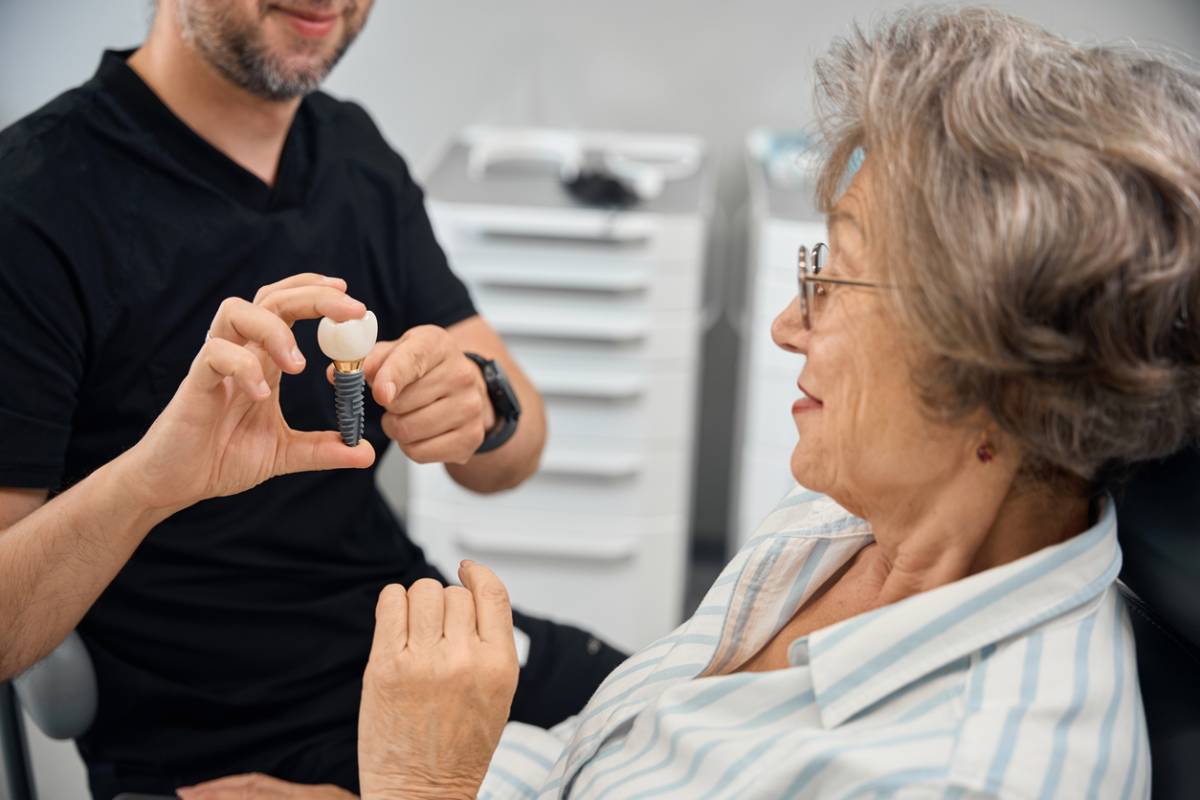Deservingly, dental implants are considered the most sophisticated type of dental restoration today. The popularity of dental implants is conditioned by their natural appearance, convenience, and reliability. Implants can help restore chewing function, thus improving nutrition and boosting your self-confidence. But do dental implants hurt? We address this question in the article below and give recommendations on how to minimize discomfort during dental implant recovery.
Do Dental Implants Hurt?
When discussing the question of whether dental implants hurt, it is essential to distinguish between the procedure of getting dental implants and the recovery period, as you will experience different sensations during these stages. Let us examine these two stages more closely.
Does the Procedure of Implant Placement Hurt?
The procedure of dental implant placement is a surgery that is always performed using a local anesthetic or sedation if the anesthetic is insufficient. These modern methods ensure that you will not experience any significant discomfort or pain during the procedure. For many patients, pain management with a local anesthetic is sufficient. However, there are instances when your doctor might offer to opt for sedation in addition to or instead of a local anesthetic:
- A patient experiences severe anxiety due to the upcoming procedure, which prevents them from going through with the treatment or causes significant stress.
- A patient finds it challenging to maintain a single position for an extended period.
- A patient has a high tolerance to local anesthetics.
- The surgery is complicated and lengthy
Common types of sedation used in dentistry include:
- Laughing gas or nitrous oxide (a conscious sedation administered via inhalation)
- Oral conscious sedation (a pill taken by mouth)
- IV sedation (the strongest type of conscious sedation)
- General anesthesia (an unconscious sedation, only used for very complicated procedures)
Will You Feel Pain During Dental Implant Recovery?
Feeling some pain and soreness for several days after a dental implant surgery is likely and expected. Other symptoms you can experience during your dental implant recovery include swelling and bruising of the face and jaw on the side of the procedure.
You will start experiencing these symptoms once the anesthetic wears off, approximately two hours after the procedure. They will gradually subside as the initial recovery progresses, which can take up to two to four weeks. You can also experience minor bleeding in the first couple of hours after the surgery, but it should not last longer than that. If bleeding, pain, or swelling persist or intensify over time, contact your doctor immediately, as these symptoms may indicate an infection or dental implant failure.
To manage pain and swelling, we recommend following these tips:
- Keep your head lifted when resting. You can use an additional pillow or sleep in a reclining chair.
- Use over-the-counter painkillers, such as Ibuprofen, to alleviate pain and soreness. However, be mindful of the daily dose of these medications and follow the provided instructions.
- Apply cold compresses to the side of your face that was treated during the procedure. Keep a compress for 10 to 15 minutes and take 30-minute breaks between applications.
- Switch to a liquid diet for the first couple of days after the procedure and then continue with a soft diet until the pain and swelling go away. Also, always chew on the opposite side of your mouth. This way, you will prevent straining the jawbone and thus help reduce pain.
- Avoid sports or any other strenuous activities that require lifting heavy objects or bending your head down. Such activities will increase blood flow to the surgical site and may provoke pain and swelling.
- Ensure that the surgical site does not become infected, as infections can cause more pain and swelling and may lead to implant failure. Keep efficient oral hygiene by brushing your teeth twice a day and flossing every evening (be careful when cleaning at the procedure site). Also, gently rinse your mouth with a saltwater solution after meals.
Other tips for swift dental implant recovery include:
- Abstain from nicotine and alcohol, as they slow down regeneration
- Make sure to take the entire course of medication your doctor prescribes (typically antibiotics)
- Maintain a balanced diet rich in vitamins, minerals, and protein to support faster regeneration.
Get a Stress-Free Dental Implant Surgery at Shodhan Yucaipa
Do not hesitate to make an appointment with an experienced dentist at the Shodhan Yucaipa dental office today. At our clinic, we utilize modern methods and high-quality materials to provide stress-free dental implant procedures and achieve long-lasting results for our patients.

